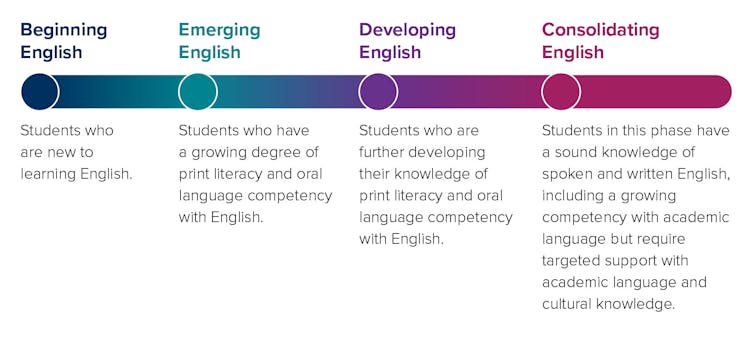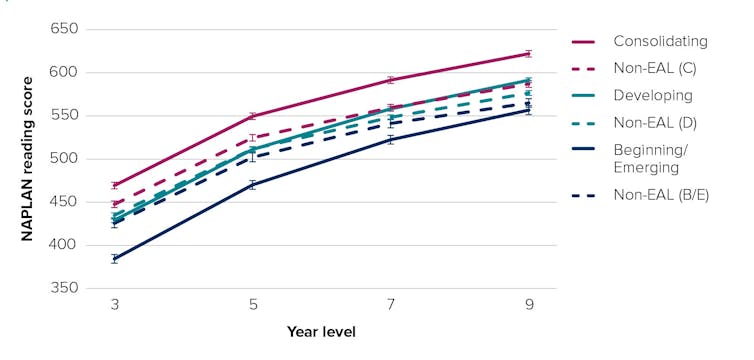
About one quarter of Australian school students are learning English as an additional language or dialect.
This means their first language or dialect is something other than English and they need extra support to develop proficiency in what we call standard Australian English.
This group of students includes immigrants and refugees from non-English speaking countries, children of migrant heritage where English is not spoken at home and Aboriginal and Torres Strait Islander students.
But the level and duration of support they receive varies across schools. This is an issue because these students risk underachieving or being labelled as having learning difficulties without adequate help.
Until now, little was known about how long these students take to learn English.
Our new research published today by the Australian Education Research Organisation, found it can take many years for students to develop the English language skills they need. This suggests students need ongoing and targeted support to learn English as an additional language.
Our study
We looked at more than 110,000 primary and high school students in New South Wales public schools over a nine-year period.
The students were learning English as an additional language from 2014 to 2022. Our research used two methods.
First, we analysed how long it took these students to achieve the same scores in their NAPLAN reading and writing tests as their English-speaking peers with the same background characteristics. That is, students were matched for characteristics such as gender, student socio-educational advantage and school location.
Second, we analysed how long it took students learning English as an additional language to reach certain phases of language proficiency. There is a national learning progression resource for schools supporting students learning English as an additional language. It has four phases: beginning, emerging, developing and consolidating.

It can take many years to learn English
Combining both methods, we found students need considerable time to learn English as an additional language.
For students who were assessed as “beginning” when they started school, it takes an average of six years to reach the final “consolidating” phase.
This means those students starting in kindergarten (the first year of school in NSW) are likely to need English language support throughout primary school.
For “beginning” students who start in later years, they may need continued English language support in high school.
Students who started school at the “emerging” and “developing” phases take, on average, four and three years, respectively to have English skills on par with their peers.
Learning English takes longer as you go along
We also found as students learned English, each phase in their progression took longer to achieve than the one before:
the average time from beginning to emerging was one year and one month
from emerging to developing was one year and eight months
from developing to consolidating was two years and seven months.
What can impact learning?
But learning English is complex and can be impacted by many factors.
We found students with socio-educational disadvantage progressed 22% slower than advantaged students, students with refugee experiences progressed 14% slower than those without. Male students took 6% longer than their female peers.
We also found students starting school in kindergarten progressed about 9% slower, compared to starting school in Australia in later primary year levels.
But we found students who started school already at the final, “consolidating” phase of English outperformed monolingual peers in NAPLAN. This suggests these students, who are arguably bilingual, were at an educational advantage.

Targeted support is needed
Our findings have a number of implications.
Firstly, they help us understand the nature and length of support needed for students learning English students in schools.
Secondly, they highlight the importance of ongoing, targeted support for students.
This also suggests we need to make effective professional support available for teachers working with students who are learning English as an additional language.
The academic advantage of bilingual students also points to a need to encourage and support students using and developing their first and other languages, alongside English.
Lucy Lu is the Senior Manager, Analytics and Strategic Projects in the Australian Education Research Organisation (AERO). AERO is jointly funded by the Commonwealth, state and territory governments.
Jennifer Hammond has previously received funding from the Australian Research Council and the NSW Department of Education. All projects funded from these sources were completed more than six years ago.
This article was originally published on The Conversation. Read the original article.







